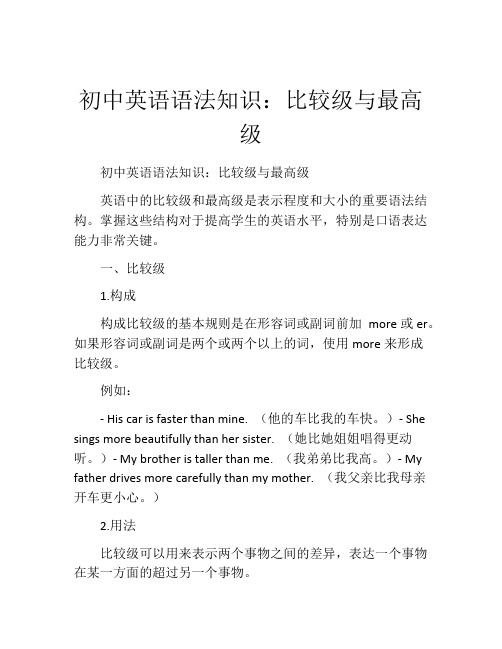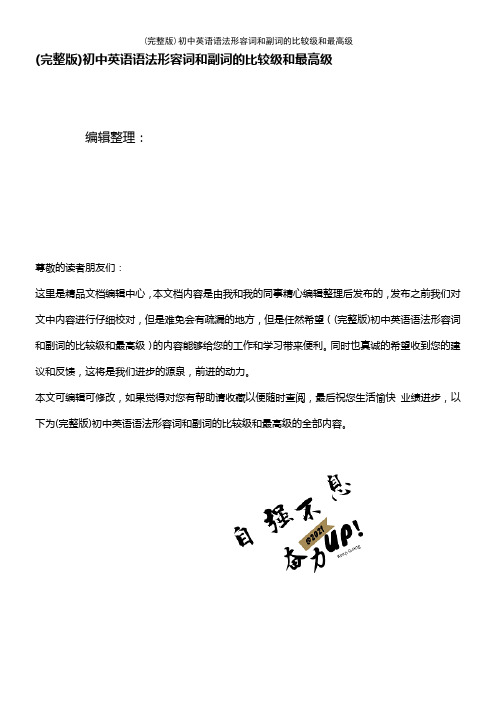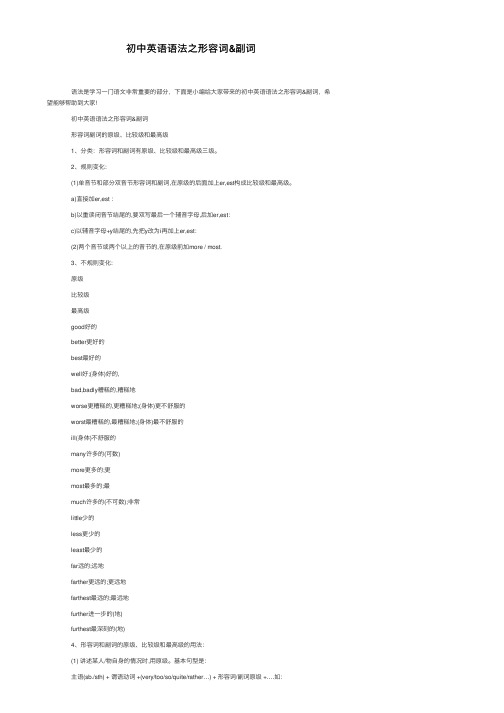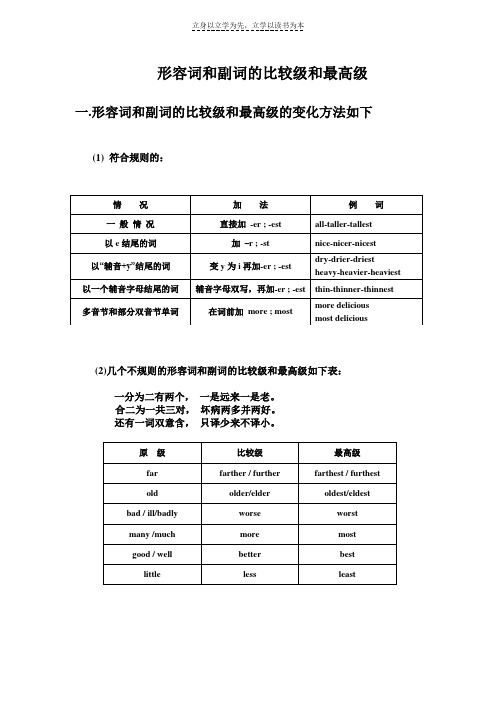初中英语语法形容词和副词的比较级和最高级简单记法
初中英语语法形容词和副词的比较级和最高级

(2)几个不规则的形容词和副词的比较级和最高级如下表:注意:有些形容词,如dead, empty, round, sure, woolen 等受本身含义的限制,没有比较级。
三.形容词副词比较级最高级的其他用法(1)和冠词连用the +形容词原级+v(复),指一类人或物the +形容词比较级,指两者中“较…的”的那一个,eg. the younger of the twoa/ an +形容词比较级eg. The pen is expensive. I want a cheaper one.( a) +most+形容词最高级“非常…”eg. a most beautiful city( 2 ) 相关结构1)原级比较:肯定句as….as…., 否定句not so / as….as…..2)比较句:比较级+than….或more (less) ….than…..The furniture in this shop is less beautiful than that in that shop.(注意代词that的用法)3)比较级+and+比较级或more and more+比较级“越来越… ”richer and richer, more and more interesting4)The more….., the more…..“越…,越…”The more you look at the picture, the better you will like it.5) 比较级+than any other +n. (单)(适用于范围一致时)(all) other +n.(复)any +n.(单) (适用于范围不一致时)He is taller than any other student / all other students in his class.any student in my class.6) 倍数表达法。
初中英语语法知识:比较级与最高级

初中英语语法知识:比较级与最高级初中英语语法知识:比较级与最高级英语中的比较级和最高级是表示程度和大小的重要语法结构。
掌握这些结构对于提高学生的英语水平,特别是口语表达能力非常关键。
一、比较级1.构成构成比较级的基本规则是在形容词或副词前加more或er。
如果形容词或副词是两个或两个以上的词,使用more来形成比较级。
例如:- His car is faster than mine. (他的车比我的车快。
)- She sings more beautifully than her sister. (她比她姐姐唱得更动听。
)- My brother is taller than me. (我弟弟比我高。
)- My father drives more carefully than my mother. (我父亲比我母亲开车更小心。
)2.用法比较级可以用来表示两个事物之间的差异,表达一个事物在某一方面的超过另一个事物。
例如:- This book is more interesting than that one. (这本书比那本书更有趣。
)- The test was easier than I thought. (这次考试比我想象中的要容易。
)- Tom runs faster than John. (Tom跑步比John快。
)除此之外,比较级还可以用来表示同一事物在不同时期或不同情况下的变化,以及表示一个事件的过程。
例如:- The weather was colder yesterday. (昨天的天气比今天的更冷。
)- My English has improved a lot over the past year. (我在过去一年里英语进步了很多。
)- I’m f eeling better than I did this morning. (我现在感觉比早上好多了。
)- Susan is getting thinner and thinner. (Susan越来越瘦了。
初中英语语法之形容词,副词

初中英语语法之形容词&副词初中英语语法之形容词&副词形容词副词的原级、比较级和最高级1、分类:形容词和副词有原级、比较级和最高级三级。
2、规则变化:(1)单音节和部分双音节形容词和副词,在原级的后面加上er,est构成比较级和最高级。
a)直接加er,est :b)以重读闭音节结尾的,要双写最后一个辅音字母,后加er,est:c)以辅音字母+y结尾的,先把y改为i再加上er,est:(2)两个音节或两个以上的音节的,在原级前加more / most.3、不规则变化:原级比较级最高级good好的better更好的best最好的well好;(身体)好的,bad,badly糟糕的,糟糕地worse更糟糕的,更糟糕地;(身体)更不舒服的worst最糟糕的,最糟糕地;(身体)最不舒服的ill(身体)不舒服的many许多的(可数)more更多的;更most最多的;最much许多的(不可数);非常little少的less更少的least最少的far远的;远地farther更远的;更远地farthest最远的;最远地further进一步的(地)furthest最深刻的(地)4、形容词和副词的原级、比较级和最高级的用法:(1) 讲述某人/物自身的情况时,用原级。
基本句型是:主语(sb./sth) + 谓语动词+(very/too/so/quite/rather…) + 形容词/副词原级+….如:He is very oldnow. 他现在很老了。
They ran quitefast. 它们跑得相当快。
The weatherlooks rather bad. 天气看上去相当糟。
I am sohappy! 我是如此的快乐!☆表示两者之间没有差别时,使用句型:主语(第一个人物) + 谓语动词 + as + 形容词/副词原级 + as + 第二个人物+….如He is as excited as his younger sister. 他和他妹妹一样兴奋。
(2021年整理)初中英语语法形容词和副词的比较级和最高级

(完整版)初中英语语法形容词和副词的比较级和最高级编辑整理:尊敬的读者朋友们:这里是精品文档编辑中心,本文档内容是由我和我的同事精心编辑整理后发布的,发布之前我们对文中内容进行仔细校对,但是难免会有疏漏的地方,但是任然希望((完整版)初中英语语法形容词和副词的比较级和最高级)的内容能够给您的工作和学习带来便利。
同时也真诚的希望收到您的建议和反馈,这将是我们进步的源泉,前进的动力。
本文可编辑可修改,如果觉得对您有帮助请收藏以便随时查阅,最后祝您生活愉快业绩进步,以下为(完整版)初中英语语法形容词和副词的比较级和最高级的全部内容。
(完整版)初中英语语法形容词和副词的比较级和最高级编辑整理:张嬗雒老师尊敬的读者朋友们:这里是精品文档编辑中心,本文档内容是由我和我的同事精心编辑整理后发布到文库,发布之前我们对文中内容进行仔细校对,但是难免会有疏漏的地方,但是我们任然希望(完整版)初中英语语法形容词和副词的比较级和最高级这篇文档能够给您的工作和学习带来便利。
同时我们也真诚的希望收到您的建议和反馈到下面的留言区,这将是我们进步的源泉,前进的动力。
本文可编辑可修改,如果觉得对您有帮助请下载收藏以便随时查阅,最后祝您生活愉快业绩进步,以下为 <(完整版)初中英语语法形容词和副词的比较级和最高级> 这篇文档的全部内容.:有些形容词,如 dead, empty, round, sure, woolen 等受本身含义的限制,没有比较级.相关结构1)原级比较:肯定句as…。
as…., 否定句not so / as….as….。
2)比较句:比较级+than….或more (less)+adj ….than…。
.The furniture in this shop is less beautiful than that in that shop.(注意代词that的用法)3)比较级+ and+比较级或 more and more+比较级“越来越… "richer and richer, more and more interesting4)The more…。
初中英语语法之形容词副词

初中英语语法之形容词&副词 语法是学习⼀门语⽂⾮常重要的部分,下⾯是⼩编给⼤家带来的初中英语语法之形容词&副词,希望能够帮助到⼤家! 初中英语语法之形容词&副词 形容词副词的原级、⽐较级和最⾼级 1、分类:形容词和副词有原级、⽐较级和最⾼级三级。
2、规则变化: (1)单⾳节和部分双⾳节形容词和副词,在原级的后⾯加上er,est构成⽐较级和最⾼级。
a)直接加er,est : b)以重读闭⾳节结尾的,要双写最后⼀个辅⾳字母,后加er,est: c)以辅⾳字母+y结尾的,先把y改为i再加上er,est: (2)两个⾳节或两个以上的⾳节的,在原级前加more / most. 3、不规则变化: 原级 ⽐较级 最⾼级 good好的 better更好的 best最好的 well好;(⾝体)好的, bad,badly糟糕的,糟糕地 worse更糟糕的,更糟糕地;(⾝体)更不舒服的 worst最糟糕的,最糟糕地;(⾝体)最不舒服的 ill(⾝体)不舒服的 many许多的(可数) more更多的;更 most最多的;最 much许多的(不可数);⾮常 little少的 less更少的 least最少的 far远的;远地 farther更远的;更远地 farthest最远的;最远地 further进⼀步的(地) furthest最深刻的(地) 4、形容词和副词的原级、⽐较级和最⾼级的⽤法: (1) 讲述某⼈/物⾃⾝的情况时,⽤原级。
基本句型是: 主语(sb./sth) + 谓语动词 +(very/too/so/quite/rather…) + 形容词/副词原级 +….如: He is very oldnow. 他现在很⽼了。
They ran quitefast. 它们跑得相当快。
The weatherlooks rather bad. 天⽓看上去相当糟。
I am sohappy! 我是如此的快乐! ☆表⽰两者之间没有差别时,使⽤句型: 主语(第⼀个⼈物) + 谓语动词 + as + 形容词/副词原级 + as + 第⼆个⼈物 +….如 He is as excited as his younger sister. 他和他妹妹⼀样兴奋。
初中英语语法形容词和副词的比较级和最高级简单记法

形容词和副词的比较级和最高级一.形容词和副词的比较级和最高级的变化方法如下(1) 符合规则的:(2)几个不规则的形容词和副词的比较级和最高级如下表:一分为二有两个,一是远来一是老。
合二为一共三对,坏病两多并两好。
还有一词双意含,只译少来不译小。
二.形容词和副词比较级的用法注意:有些形容词,如dead, empty, round, sure, woolen等受本身含义的限制,没有比较级。
例题解析1. He is ________ friends than I.A. much moreB. many moreC. very moreD. too more解析:后面有可数名词复数时,many的比较级形式为many more 修饰。
应选B.2. Which is the _________ country, Japan or Australia?A. more developedB. more developingC. most developedD. most developing解析:两者比较用比较级,表示"发达"用developed, 而developing 是"发展中的" 意思3. There were _______ shops in the city in 1982 than in 1990.A. littleB. fewC. fewerD. less解析:little 不能修饰可数名词,两者比较需用比较级,所以应选C.4. If you are not free today, come another day __________.A. tooB. soC. insteadD. yet解析:instead 作副词用时意为"代替,顶替",表示前面的事情没做,而是做了后面的事。
Instead一般位于句首。
应选C.5.He can't tell us ________, I think.A. important anythingB. anything importantC. important somethingD. something important.解析:不定代词与形容词联用需后置,否定句中应该用anything而不是something. 因此应选B6. The Huang River is the second __________ river in our country.A. longB. longerC. longestD. the longest解析:"定冠词the+ 序数词+ 形容词最高级" 表示"第几大……" 应选C.7. The light in the office wasn't ________for him to read.A. enough brightB. bright enoughC. brightlyD. enough brightly解析:enough修饰名词时可前可后,修饰形容词或副词时,要后置。
[全]初中英语语法比较级和最高级知识点详解
![[全]初中英语语法比较级和最高级知识点详解](https://img.taocdn.com/s3/m/3a84e0d858fafab068dc0255.png)
初中英语语法比较级和最高级知识点形容词、副词比较级和最高级一、定义。
比较级:两者之间的比较叫做比较级。
最高级:三者三者以上的比较叫做高级。
原级:没有比较,同级比较。
二、形容词、副词的比较级/最高级的构成。
1、单音节和部分双音节的词:(去,改,双,直)(1)以字母e结尾的形容词,去e加-er或-est;large ——larger ——largestnice ——nicer ——nicestlate ——later ——latest(2)以“辅音字母+y”结尾的双音节词,先改“y”为“i”,再加-er或-est;happy ——happier ——happiestearly ——earlier ——earliest(3)辅-元-辅结构的单词(重读闭音节)的形容词,双写最后一个辅音字母再加er或者est;hot —hotter —hottestthin ——thinner ——thinnest(4)在结尾加er或者est;strong ——stronger ——strongestslow ——slower ——slowest2、多音节词和部分双音节词:在词前加more或most。
delicious ——more delicious ——most deliciousbeautiful ——more beautiful ——most beautiful boring——more boring ——most boringeasily ——more easily ——most easily3、不规则变化(两个好,两个坏,两个多;一个小又少,还有一远和一老。
)good/well——better——bestbad/ill/badly——worse——worstmuch/many——more——mostlittle——less——leastfar——farther/further——farthest/furthestold——older/elder——oldest/eldest(farther是指距离或时间上"更远的''further是指程度上进一步的) 4.特殊变化:既可以+er/est,又可以+more/most的单词有clever,handsome,polite,Simple,stupid,friendly。
初中英语语法形容词和副词的比较级和最高级

注意:有些形容词,如dead, empty, round, sure, woolen 等受本身含义的限制,没有比较级。
相关结构1)原级比较:肯定句as….as…., 否定句not so / as….as…..2)比较句:比较级+than….或more (less)+adj ….than…..The furniture in this shop is less beautiful than that in that shop.(注意代词that的用法)3)比较级+and+比较级或more and more+比较级“越来越… ”richer and richer, more and more interesting4)The more….., the more…..“越…,越…”The more you look at the picture, the better you will like it.5) 比较级+than any other +n. (单)(适用于范围一致时)(all) other +n.(复)any +n.(单) (适用于范围不一致时)He is taller than any other student / all other students in his class.any student in my class.6) 倍数表达法。
A is three(four, etc.)times the size(height, length etc.)of B.A is three(four, etc.)times as big(high, long, etc.)as B.A is three (four, etc.)times bigger(higher, longer, etc.)than B.用times 表倍数通常用于三倍以上,两倍可以用twice或double.The new building is four times the size (the height)of the old one.这座新楼比那座旧楼大三倍(高三倍)。
- 1、下载文档前请自行甄别文档内容的完整性,平台不提供额外的编辑、内容补充、找答案等附加服务。
- 2、"仅部分预览"的文档,不可在线预览部分如存在完整性等问题,可反馈申请退款(可完整预览的文档不适用该条件!)。
- 3、如文档侵犯您的权益,请联系客服反馈,我们会尽快为您处理(人工客服工作时间:9:00-18:30)。
形容词和副词的比较级和最高级一.形容词和副词的比较级和最高级的变化方法如下(1) 符合规则的:(2)几个不规则的形容词和副词的比较级和最高级如下表:一分为二有两个,一是远来一是老。
合二为一共三对,坏病两多并两好。
还有一词双意含,只译少来不译小。
二.形容词和副词比较级的用法注意:有些形容词,如dead, empty, round, sure, woolen等受本身含义的限制,没有比较级。
例题解析1. He is ________ friends than I.A. much moreB. many moreC. very moreD. too more解析:后面有可数名词复数时,many的比较级形式为many more 修饰。
应选B.2. Which is the _________ country, Japan or Australia?A. more developedB. more developingC. most developedD. most developing解析:两者比较用比较级,表示"发达"用developed, 而developing 是"发展中的" 意思3. There were _______ shops in the city in 1982 than in 1990.A. littleB. fewC. fewerD. less解析:little 不能修饰可数名词,两者比较需用比较级,所以应选C.4. If you are not free today, come another day __________.A. tooB. soC. insteadD. yet解析:instead 作副词用时意为"代替,顶替",表示前面的事情没做,而是做了后面的事。
Instead一般位于句首。
应选C.5.He can't tell us ________, I think.A. important anythingB. anything importantC. important somethingD. something important.解析:不定代词与形容词联用需后置,否定句中应该用anything而不是something. 因此应选B6. The Huang River is the second __________ river in our country.A. longB. longerC. longestD. the longest解析:"定冠词the+ 序数词+ 形容词最高级" 表示"第几大……" 应选C.7. The light in the office wasn't ________for him to read.A. enough brightB. bright enoughC. brightlyD. enough brightly解析:enough修饰名词时可前可后,修饰形容词或副词时,要后置。
应选B.8. There was an accident at the corner. ________, the girl wasn't _________hurt.A. luckily, badlyB. luck, hardlyC. Lucky, heavilyD. Lucky, strongly解析:第一空修饰全句需用副词,第二空修饰形容词hurt也要用副词,因此选A.9. You must keep your eyes _________ when you do eye exercises.A. closeB. openC. closedD., opened解析: 此处需用形容词做宾语补足语。
应选C.10. Five days has passed , but I haven't finished half of the work. ________,A. alreadyB. stillC. tooD. yet解析:already 与yet 都可用于现在完成时态。
Already常用于肯定句,而yet 常用与否定句。
应选D.三.形容词副词比较级最高级的其他用法(1)和冠词连用the +形容词原级+v(复),指一类人或物the +形容词比较级,指两者中“较…的”的那一个,eg. the younger of the twoa/ an +形容词比较级eg. The pen is expensive. I want a cheaper one.( a) +most+形容词最高级“非常…”eg. a most beautiful city( 2 ) 相关结构1)原级比较:肯定句as….as…., 否定句not so / as….as…..2)比较句:比较级+than….或more (less) ….than…..The furniture in this shop is less beautiful than that in that shop.(注意代词that的用法) 3)比较级+and+比较级或more and more+比较级“越来越… ”richer and richer, more and more interesting4)The more….., the more…..“越…,越…”The more you look at the picture, the better you will like it.5) 比较级+than any other +n. (单)(适用于范围一致时)(all) other +n.(复)any +n.(单) (适用于范围不一致时)He is taller than any other student / all other students in his class.any student in my class.6) 倍数表达法。
A is three(four, etc.)times the size(height, length etc.)of B.A is three(four, etc.)times as big(high, long, etc.)as B.A is three (four, etc.)times bigger(higher, longer, etc.)than B.用times 表倍数通常用于三倍以上,两倍可以用twice或double.The new building is four times the size (the height)of the old one.这座新楼比那座旧楼大三倍(高三倍)。
Asia is four times as large as Europe.亚洲比欧洲大三倍。
Your school is three times bigger than ours.你们的学校比我们的学校大三倍。
7) more…than…结构,其意往往是…rather than…,可译为“是……而不是……”或颠倒词序译作“与其说是……,不如说是……”。
That little girl is more tired than hungry. 那个小姑娘是累了而不是饿了。
She is more a mother than a wife或She is more of a mother than a wife.她是贤妻,更是良母。
8) A is to B what C is to D A和B的关系就像C和D的关系Air is to man what water is to fish. 空气对于人类就像水和鱼的关系。
9) no more than= only “只不过”,言其少not more than=at most “不多于”,“至少”,指事实。
no more …than… 和…一样不… 如单音节使用比较级形式not more…than… 不比…更…no less than= as much as “多达”no fewer than= as many as例:I have no more than five yuan in my pocket. 我口袋里的钱只不过5元。
I have not more than five yuan in my pocket. 我口袋里的钱不多于5元。
He is no richer than I.他和我一样穷。
He is no less determined than you. 他的决心不亚于你。
(no less determined than等于“其决心不亚于你”,言其大)He is not less determined than you. 他的决心不比你小。
(not less determined than等于“其决心不小于”,无言其大或小的含义)10) 最高级+of/ in/ among….He is the tallest of the three/ among them/ in is class.四.相关词语辨析1.very 和muchA)very修饰形容词、副词的原级;much修饰比较级;修饰动词用much或very much , eg. I very like English.(×),因改为:I like English very much.B) 表示状态的过去分词前用very。
a very frightened boy, a very tired child .一般的情况下,以-ed结尾的分词多用much、very much / greatly等修饰。
如:We were greatly /much shocked by the news about Tom..C) 已转化为形容词的现在分词前用very。
如:very interesting / worrying / excitingD)too前用much/ far ,不用very。
You are much / far / a lot too nice.另外,在too many / much, too few / little前用far。
We’ve got far too many eggs and far too few egg cups.E)还有修饰词既不用very,也不用much.eg. be well worth doing, be well above the tree2. so和suchA)so … that … 与such … that … 的区别。
